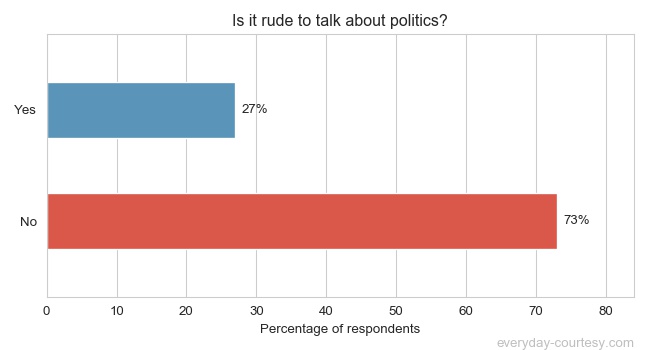With so many opinions about political topics, it is hard to know when to bring them up and when to avoid them. Is it rude to talk about politics?
Our survey found that 27% of people find it rude to bring up political topics. So most people are comfortable with this topic but avoid political discussions at work and with people, you don’t know very well.

It all depends on who you interact with and your relationship with them. Most agree there is a time and place for such discussions. If you plan to engage in the topic, be respectful of others. Share your thoughts but also listen to theirs and you both may learn something in the conversation.
It isn’t worth it to alienate yourself from friends or family over different political views. While you are entitled to your own opinions on subjects, so are they. Learning to agree to disagree about such issues makes the world a kinder place.
Many businesses have a no-politics policy in place, be it formal or informal. They don’t want issues among employees or with customers because of differences in political views.
The Survey
We polled 105 people in the United States to find out what they thought about taking up political issues. The survey panel was mostly made up of people in their twenties and thirties, with a heavy weighting in the 25-35 age bracket.

About 27% of people polled believe it is rude to talk about politics. This means you are going to be just fine talking about it around most people.
Of course, the 27% of people that will make it a huge ordeal can create quite a problem for you. Don’t put your job on the line or your overall reputation. Don’t allow it to create tension with those you care about. Identify who you can talk politics with and who you should avoid the topic with. If you aren’t sure, don’t be afraid to ask.
Small Talk
Finding a hot topic to engage in a conversation with when you meet someone new is encouraged. Yet politics may not be the right subject to bring into that scenario.
You don’t know if they will find it rude, and if they do, a roadblock between you and them comes up immediately. As a general rule of thumb, avoid being the one to bring it up.
If someone you meet asks you a direct question about politics, you aren’t obligated to discuss it. You can if you desire, but if you prefer to keep your political views private or only share with those close to you, politely tell them you don’t wish to discuss them. They should honor your request.
If you do approach the subject, do so respectfully and keep it simple. You don’t have to give deep details about why you think a certain way.
What to Say:
“Thank you for asking, but I don’t like to discuss my political views.”
“It is interesting you asked about that. This is what I think…”
“I don’t follow politics much so I am not well informed on the issue.”
“Politics open up a whole can of worms; I prefer to stick with a happier subject.”
“Everyone has their own thoughts on political issues, I try to respect that.”
Friends and Family
Your close friends and family are the ones you can share just about anything with. You can tell them what you think. You will likely pick up on who is fine to discuss the topic of politics and who will find it rude.
Spending some time talking about certain subjects with those you trust and who value your opinion can help you see a bigger picture with politics.
In any group of friends or any family, some don’t want to discuss politics. Respect that from them and keep the conversations about it off-limits in their presence.
Likewise, if you have any friends or family who like to push their political views on you but don’t listen to your thoughts, set boundaries so you don’t become a target for them.
What to Say:
“I am unclear about this topic and not sure how to vote on it. Do you understand it?”
“What are your thoughts about the proposal?”
“I can’t understand some of the decisions made by our politicians. How do you feel about what has unfolded?”
“Hopefully, the changes with our political leaders will help our country reunite.”
“I can see where you are coming from but I don’t agree with all of that.”
“I haven’t researched the subject so I prefer not to talk about it right now.”
Work Environment
It is hard to keep the topic of politics out of most work environments, but do your best. It is even harder when there are controversial topics or an election is on the horizon.
Gently remind those you work with that you prefer not to mix your political thoughts with your work environment. They should respect this.
If it becomes an issue, bring it to the attention of a supervisor so they can establish some ground rules in-house.
What to Say:
“Sorry but I prefer not to talk about politics at work.”
“I am here to do my job, not share my personal views on the topic.”
“I am sure you have some great thoughts on the topic, but work isn’t the place to share them.”
“I really don’t want to talk to anyone in the office about politics. Thank you for respecting that.”
“Talking about politics is going to create problems among us. It isn’t good for customers to overhear such conversation either. It is best if we focus our attention on work-related topics and tasks.”
Bring up a Specific Topic
When you do wish to talk about politics with someone, make sure they feel comfortable doing so. Bring up a specific topic you would like to talk to them about. Ask detailed questions to let them know you care about their thoughts on the topic.
Make sure you are a good listener so they feel like you aren’t just shoving your political agenda in their direction.
Keep emotions out of it; avoid it turning into an argument. If you feel it is moving in that direction, communicate to the other party that you agree to disagree and talk about something else.
It isn’t worth it to get into a heated debate over something political.
What to Say:
“How do you feel about the issue surrounding…”
“I value our relationship; I don’t want it to be harmed over talking politics. Let’s agree that we don’t see this issue the same and leave it at that. I value your thoughts on it but see it differently.”
“Can you share with me why you feel that way about it?”
“That is interesting; can you tell me where you got your information from? I want to look into it further.”
“Thanks for exploring the topic with me. I learned things I didn’t know about it before. I hope you did too.”

Matt Vargas is an author and public speaking coach with a degree in sociology and more than ten years of practical experience. Matt is responsible for the empirical surveys at everyday-courtesy.com, is a passionate recreational musician, and blogs here about his experiences in the field of interpersonal communication.

